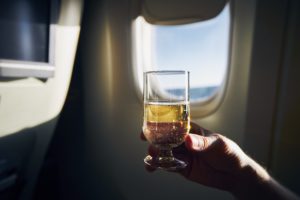Does one drink on a plane really feel like two on land? It’s a common myth that alcohol hits you harder on a plane (something that many people attribute to the altitude) but is it really true? We asked a doctor to find out.
According to Dr. Yvette McQueen, an emergency medicine physician and travel doctor, you can’t blame the altitude for getting drunk on a plane. "No, you do not get drunk faster on an airplane,” says Dr. McQueen. “Your alcohol level is processed the same as if you were on the ground. The pressurized compartment on the airplane allows for adequate oxygenation and does not simulate high altitude situations like in the mountains.”
So why do you sometimes feel a little tipsy after one glass of in-flight wine, when one drink normally wouldn’t impact you at all? Other factors of travel are probably amplifying your intoxication level. “The variant that can affect your alcohol content, drunkenness, and behavior during travel is dehydration,” warns Dr. McQueen. “Between the change of your daily routine and low humidity inside the airplane, dehydration is a common factor with travelers.”
Basically, if you’re already tired/dehydrated, alcohol is only going to intensify those feelings, no matter what altitude you’re at—something to keep in mind for those post-flight drinks on the ground as well.
Related: The 7 Best Wine Bags and Suitcases That Will Keep Your Wine Safe
Still want to enjoy an in-flight drink? Dr. McQueen advises that passengers eat before imbibing, and to drink a glass of water along with each alcoholic drink. Choose a non-carbonated drink (skip the beer or sparkling wine), as the bubbles can cause bloating while in the air, which can make the remainder of your flight uncomfortable.






